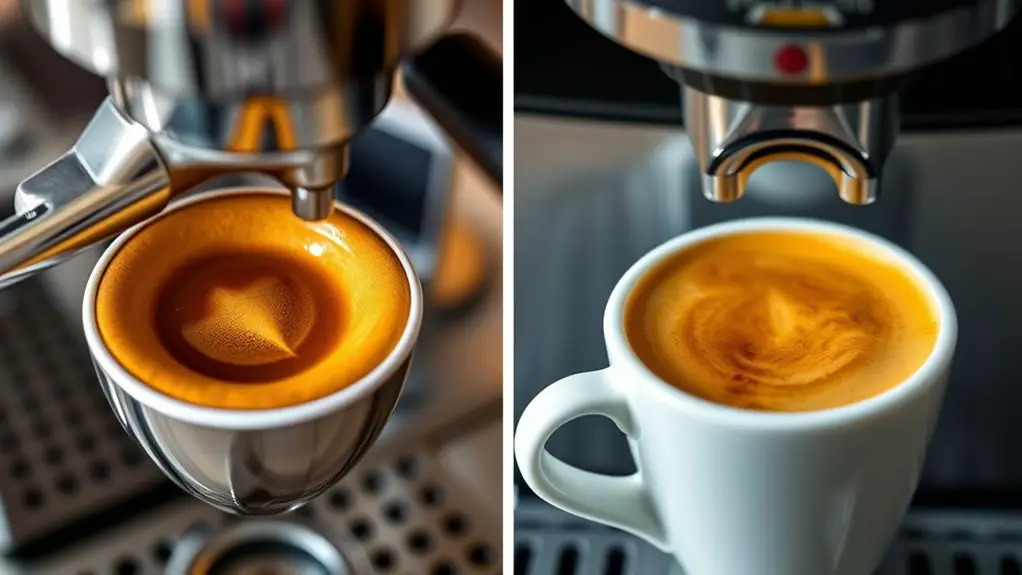When comparing Gaggia and De'Longhi espresso machines for the best crema, Gaggia typically produces a richer crema texture, enhancing flavor complexity. In contrast, De'Longhi offers a cleaner crema that balances flavors well. Factors like grind size, pressure settings, and temperature stability play critical roles in these outcomes. Considering user experience, Gaggia provides straightforward controls, while De'Longhi allows for programmability. For those wanting to understand how these machines operate, exploring deeper insights into their technology and maintenance will prove beneficial.
Overview of Gaggia Espresso Machines
When considering espresso machines, Gaggia stands out for its rich heritage and commitment to quality. You'll find that Gaggia features robust construction, innovative technology, and user-friendly designs across its range of Gaggia models. From the entry-level Gaggia Classic to the high-end Gaggia Anima, each model delivers distinct advantages tailored to different brewing preferences. The Classic offers a commercial-style portafilter, while the Anima boasts a built-in grinder and customizable settings, catering to your desire for freedom in crafting the perfect espresso. Additionally, Gaggia machines often include advanced temperature control and steam wand capabilities, ensuring ideal extraction and frothing. This versatility empowers you to explore your barista skills without compromising on quality or consistency. Similar to Lelit Anna, Gaggia machines are also designed to be user-friendly, making them accessible for beginners.
Overview of De'Longhi Espresso Machines
While exploring the world of espresso machines, De'Longhi emerges as a formidable contender, known for its innovative designs and versatile functionality. Their range includes several De'Longhi models, each equipped with advanced brewing technology tailored to enhance your espresso experience. For instance, the Magnifica series features a patented coffee and crema system, allowing for customizable settings to suit your preferences. Additionally, the EC9355 offers a dual heating system that guarantees ideal coffee extraction and milk frothing simultaneously. Whether you're after a compact option or a more sophisticated machine, De'Longhi's versatility caters to various skill levels and brewing styles. With these models, you're empowered to explore the art of espresso making while enjoying the freedom to experiment with flavors and techniques. Regular cleaning with eco-friendly options ensures optimal performance and longevity of your espresso machine.
The Science Behind Crema Production
Although many appreciate the rich flavor of espresso, the allure of its crema—an essential layer atop a well-brewed shot—lies in its complex formation process. Crema formation occurs during espresso extraction, where high pressure forces hot water through finely ground coffee. This process emulsifies oils and gases, creating a frothy layer that enhances both aroma and mouthfeel. The ideal crema is a result of precise variables: grind size, water temperature, and extraction time all play vital roles. Under-extraction can lead to thin, pale crema, while over-extraction results in bitterness. Understanding these factors enables you to master the art of espresso, ensuring that every shot delivers the perfect balance of flavor and crema, satisfying your quest for coffee excellence. Proper espresso machine maintenance is also crucial to achieving a consistently rich crema.
Flavor and Consistency: A Comparative Analysis
The nuances of flavor and consistency in espresso can profoundly impact your overall coffee experience, as each machine's design and brewing parameters influence the final result. Gaggia machines often produce a rich crema texture, enhancing the flavor profile with a velvety mouthfeel and pronounced sweetness. In contrast, De'Longhi tends to deliver a more balanced flavor, with a cleaner crema that emphasizes acidity and brightness. The pressure settings and temperature stability in both machines play critical roles in extracting essential oils and flavors from the coffee grounds. When comparing these two, consider how the crema texture interacts with the flavor profile; it can elevate or detract from your espresso's complexity. Ultimately, your preference will dictate which machine aligns with your ideal espresso experience.
User Experience and Maintenance Considerations
When considering an espresso machine, user experience and maintenance are essential factors that can greatly affect your overall satisfaction. Gaggia and De'Longhi offer distinctive interfaces, with Gaggia often praised for its straightforward controls, making it user-friendly for novices. In contrast, De'Longhi features programmable settings that cater to enthusiasts seeking customization.
For maintenance tips, both brands require regular descaling to prevent mineral buildup; however, Gaggia's components are generally easier to access, simplifying cleaning tasks. De'Longhi's automatic cleaning cycles can be beneficial for busy users, but they may require more frequent attention to milk frothers. Ultimately, your choice depends on how much control you want over the brewing process and how much time you're willing to invest in upkeep.
Frequently Asked Questions
What Is the Price Range for Gaggia and De'longhi Espresso Machines?
When considering price ranges, Gaggia and De'Longhi offer affordable options starting around $150, while premium features can elevate prices to over $1,500. Analyze your needs to find the perfect balance between cost and performance.
How Long Do Gaggia and De'longhi Machines Typically Last?
When you invest in an espresso machine, envision a sturdy ship sailing through time. With proper care, Gaggia and De'Longhi machines boast a lifespan of 5 to 15 years, reflecting their robust build quality and reliability.
Are Replacement Parts Readily Available for Both Brands?
When considering replacement part availability, both brands offer decent access through various retailers and brand support services. However, Gaggia typically has a more extensive network, ensuring you can find components easier when needed.
Do Either Brand Machines Require Special Water Filters?
When considering water quality, both brands offer options for filter compatibility. You'll find that using specific filters enhances flavor and protects your machine. Ultimately, your choice influences the overall espresso experience, ensuring freedom to customize.
Can I Use Non-Coffee Beans in These Machines?
You can't use non-coffee beans in these machines, as they're designed for coffee bean compatibility. Espresso alternatives may require specific adjustments, but for ideal performance, stick to traditional coffee beans for the best results.
